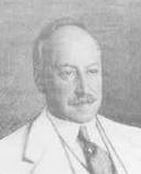Creator of Aspirin
Arthur Eichengrün (1867-1949) was born in Aachen, Germany, the son of a clothing merchant. After studying chemistry, he joined the pharmaceutical giant Bayer in 1896, and the following year developed Protargol, an effective medication for gonorrhea that was the standard for over 50 years. At around the same time, Eichengrün devised a new process to purify acetylsalicylic acid, while also finding a way to make it safe and tolerable for the human stomach. Thus was born Aspirin. Today, it is among the most widely used drugs in the world, with over 50,000 tonnes of it consumed annually. Unfortunately, when the Nazis came to power, the idea of a Jewish inventor for Aspirin could not be tolerated, and Bayer eliminated Eichengrün’s name (by then, Bayer was incorporated into IG Farben, the company notorious for manufacturing Zyklon B – the chemical used in the gas chambers of the Holocaust). Soon, Eichengrün’s own company was “Aryanized”, and by 1943 he was arrested and sent first to prison, and then a concentration camp. For many decades, Eichengrün’s name was hardly known, as historians simply accepted the Bayer lie that Felix Hoffman developed Aspirin. In 1999, however, scholars re-examined the case and concluded that indeed it is Eichengrün that should be credited. In fact, recent evidence suggests that Eichengrün even came up with the “Aspirin” name. Aside from Aspirin, Eichengrün held 47 patents, among them the invention of a hard, non-flammable plastic called Cellon, anti-rust and anti-freeze agents, as well as several inventions critical to the film and photography industries. He has been hailed as a pioneer in both pharmaceutical and industrial chemistry.
Words of the Week
All the world is a very narrow bridge, and the main thing is to have no fear at all.
– Rebbe Nachman of Breslov

